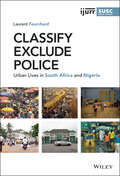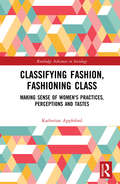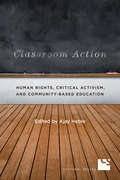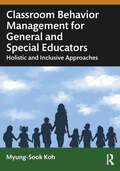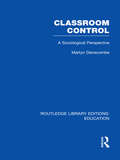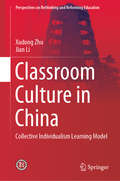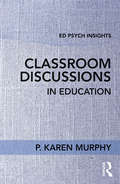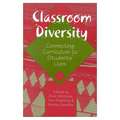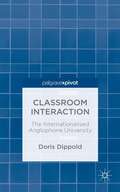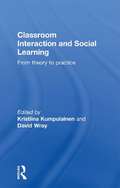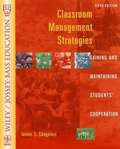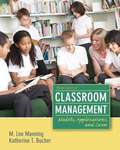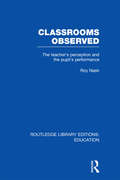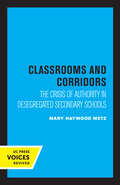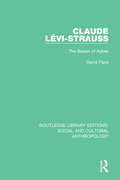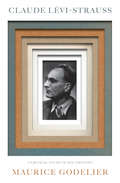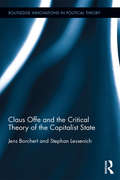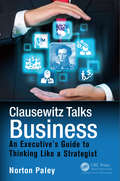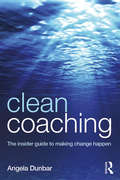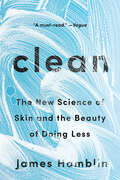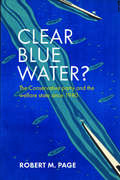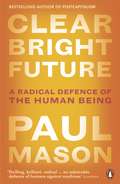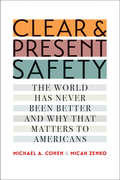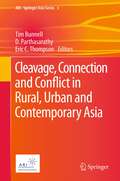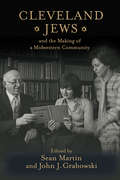- Table View
- List View
Classify, Exclude, Police: Urban Lives in South Africa and Nigeria (IJURR Studies in Urban and Social Change Book Series)
by Laurent FourchardAn important contribution to academic conversations between history, social sciences, and comparative urban studies that explores the effects and limits of public action on urban lives. Examines the limits and effects of public action in urban settings and explores comparisons between cities commonly viewed as incommensurable Integrates historical and ethnographic methods and focuses on state formation, urbanization, and daily lives Addresses debates and controversies in comparative urban studies, history, political science, and urban anthropology Provides a systematic, comparative approach to the practices, processes, arrangements used to create boundaries, direct violence, and produce social, racial, gender, and generational differences
Classifying Fashion, Fashioning Class: Making Sense of Women's Practices, Perceptions and Tastes (Routledge Advances in Sociology)
by Katherine ApplefordDrawing together theoretical ideas from across the social sciences, Classifying Fashion, Fashioning Class examines how the fashion-class association has developed and, using the experiences of middle-and-working class British women, demonstrates how this relationship operates today. Though increasingly academics argue that contemporary class distinctions are made through cultural practices and tastes, few have fully explored just how individual’s fashion choices mobilise class and are used in class evaluations. Yet, an individual’s everyday dress is perhaps the most immediate marker of taste, and thus an important means of class distinction. This is particularly true for women, as their performances of respectability, femininity and motherhood are embodied by fashion and shaped by class. In unpacking this fashion-class relationship, the book explores how fashion is used by British women to talk about class. It offers important insights into the ways fashion mobilises class differences in understandings of dressing up, performance and public space. It considers how class identity shapes women’s attitudes concerning fashion trends and classic styles, and it draws attention to the pivotal role mothers play in cultivating these class distinctions. The book will be of interest to students in sociology, fashion studies, cultural studies, human geography and consumer behaviour.
Classroom Action: Human Rights, Critical Activism, and Community-Based Education
by Ajay HebleBuilding on the concept of a “teaching community,” Heble and his contributors explore what it might mean for teachers and students to reach outside the walls of the classroom and attempt to establish meaningful connections between the ideas and theories they have learned and the broader community beyond campus. Utilizing a case study approach, the chapters in this volume are conceptually and practically useful for teachers and students involved in thinking about and implementing community-based forms of teaching and learning. Classroom Action links teaching and research in genuinely innovative ways, and provides a range of dissemination strategies to inspire broad-based outcomes and impact among a diverse range of knowledge-users. It marks a major advance on the ways in which the relationship among pedagogy, human rights, and community-based learning has hitherto been theorized and practiced. The community-based learning at the centre of Classroom Action prompts a radically new means of thinking about what teachers do in the classroom, and how and why they do it.
Classroom Behavior Management for General and Special Educators: Holistic and Inclusive Approaches
by Myung-Sook KohThis comprehensive textbook outlines a holistic approach to inclusive classroom management. It critically examines the limitations inherent in behaviorism-based methods— particularly the Positive Behavior Interventions and Supports (PBIS) framework rooted in Applied Behavior Analysis (ABA)— and offers an alternative that integrates the full spectrum of student needs and the complexities of modern educational dynamics. Addressing the interconnected crises of falling academic standards, rising teacher turnover, and growing student behavioral and emotional challenges, the book presents a comprehensive, actionable strategy for accurately identifying classroom deficiencies and effectively responding to them in a student-centered way. Applicable to both special education and general educational contexts, Classroom Behavior Management for General and Special Educators is key reading for pre-service teachers in classroom and behavior management courses, as well as in-service teachers, teacher educators, and school administrators seeking new ways to address student behavior.
Classroom Control: A Sociological Perspective (Routledge Library Editions: Education)
by Martyn DenscombeSurvival as a school teacher depends on an ability to achieve classroom control. In the years since this book was first published little has changed in this respect. Classroom control continues to lie at the heart of competent teaching. Teachers know it, pupils know it. They know it implicitly because they experience it as a normal part of their daily lives in schools. But, in this book, the author stands back from our everyday knowledge about how things work in classrooms to ask what control actually consists of. What is it? How is it recognized? How is it challenged by pupils? How is done by teachers? How is it negotiated? Drawing on extensive ethnographic fieldwork in three large secondary schools in England Martyn Denscombe explores the meaning of classroom control. He looks at the influence of teacher training and the role of school organization in establishing expectations about control, and then shows how control is played out through the interaction of teachers and pupils in class. His analysis travels well across the many contexts in which teaching occurs and provides an illuminating insight into the work of teaching and the nature of classroom life. His evidence is drawn from ethnographic fieldwork in three schools in England, and secondary sources covering the phenomenon of classroom control in the UK, USA and Australia.
Classroom Culture in China: Collective Individualism Learning Model (Perspectives on Rethinking and Reforming Education)
by Jian Li Xudong ZhuThis book comprehensively examines classroom culture in the Chinese context and develops the model of “collective-individualism-based learning.” Classroom culture plays a fundamental role in constructing students’ learning competencies, perceptions, and behaviors. This book puts forward a collective-individualism-based learning model to explain the classroom culture in China, both past and present. The collective-individualism-based model reflects the individualized learning style of students in Chinese classroom culture, and is characterized by nine symbolic objects; a textbook, an exercise book, a pen, a blackboard, a screen, a computer, a table, a chair, and a platform. In addition to summarizing this approach to learning, the book examines the construction of a classroom culture with Chinese characteristics and argues that the collective-individualism-based model accurately portrays the personal learning style of students in a specific classroom culture that includes particular symbolic objects.
Classroom Discussions in Education: Improving Students' Comprehension Through Productive Talk About Text (Ed Psych Insights)
by P. Karen MurphyClassroom discussion is a concept familiar across the field of education and is often employed to support students’ comprehension of text. Edited by a leading expert on classroom discussion, this book situates the topic within the broader context of educational psychology research and theory and brings it to a wider audience. Five chapters describe in detail the different approaches to discussion and provide recommendations for best practices and curricular materials for student success. This concise volume is designed for any education course that includes discussion in the curriculum and is indispensible for student researchers and both pre- and in-service teachers alike.
Classroom Diversity: Connecting Curriculum to Students' Lives
by Ellen Mcintyre Norma Gonzalez Ann RoseberyClassroom Diversity takes a "sociocultural" approach to curriculum design, which provides minority and working-class students with the same privileges that middle-class students have always had: instruction that puts their knowledge and experiences at the heart of their learning. It presents both the theoretical framework for linking students' lives with curriculum and specific strategies from teachers who have done so successfully. Their stories show African American, Haitian American, Latino, Native American, and rural white students of Appalachian descent engaged in contextualized learning as they read and write and do mathematics and science across the grades. All of the classrooms described share one important characteristic: they use students' household-based funds of knowledge as resources for school-based funds of knowledge, building bridges in nontraditional ways.
Classroom Interaction: The Internationalised Anglophone University
by Doris DippoldInternationalisation has had a forceful impact on universities across the Anglophone world. This book reviews what we know about interaction in the Anglophone university classroom, describes the challenges students and tutors face, and illustrates how they can overcome these challenges by drawing on their own experiences and practices.
Classroom Interactions and Social Learning: From Theory to Practice
by David Wray Kristiina KumpulainenToday's classroom presents a wealth of opportunities for social interaction amongst pupils, leading to increased interest in teachers and researchers into the social nature of learning.While classroom interaction can be a valuable tool for learning, it does not necessarily lead to useful learning experiences. Through case studies, this book highlights the use of new analytical methodologies for studying the content and patterns of children's interactions and how these contribute to their construction of knowledge.Classroom Interaction and Social Learning will be of interest to students and in service teachers and researchers concerned with classroom discourse and learning.
Classroom Management Strategies: Gaining and Maintaining Students' Cooperation (Fifth Edition)
by James S. CangelosiGet the latest research in learning theory, student motivation, behavior modification, and more. This fifth edition equips educators with research-based principles and proven, real-world strategies for getting students to cooperate and keeping them on-task. You'll also learn how to accommodate the special needs of students with disabilities, work productively with students for whom English is not a first language, and take advantage of the cultural diversity in classrooms to enhance students' learning experiences.
Classroom Management: Models, Applications and Cases (3rd Edition)
by Katherine T. Bucher M. Lee ManningManning and Bucher (Old Dominion U. ) describe classroom management models, applications, and cases for preservice and inservice teachers. They address the need for classroom management and discipline, the effects of classroom problems, and the need to consider student diversity; the problem of violence and bullying; general management models for elementary to high school levels, based on research and ranging from foundational to newer theorists; special issues, including culturally and gender responsive management; and developing a management plan. This edition has new emphasis on bullying and school safety, including cyberbullying; 18 new models and theories; revision of the models; organization by philosophical perspective; two new chapters on inclusion and diversity; new chapter structure, features, and readings; and opening vignettes. It omits biographies of theorists. Annotation ©2012 Book News, Inc. , Portland, OR (booknews. com)
Classrooms Observed: The Teacher's Perception and the Pupil's Peformance (Routledge Library Editions: Education)
by Roy NashIn this study – the outcome of three years’ participant observation in local authority primary and secondary schools – the classroom teacher is shown to have a far greater impact upon and responsibility for his pupils than is generally admitted. The teacher’s perceptions of the children in his class are demonstrated to have a more important bearing on the pupils’ attainment than the major factor of their social class. In carrying out this research, Roy Nash has moved outside the mainstream tradition of educational psychology to take into account the methods of anthropology and sociology. He shows, by looking at the actual behaviour of teachers and children in classrooms, and by following the pupils from several different primary schools through to the same local authority secondary school, how the teacher’s expectations for his pupils can act as self-fulfilling prophecies. The author’s illuminating research is illustrated with tables and with three Appendices.
Classrooms and Corridors: The Crisis of Authority in Desegregated Secondary Schools
by Mary Haywood MetzThis title is part of UC Press's Voices Revived program, which commemorates University of California Press’s mission to seek out and cultivate the brightest minds and give them voice, reach, and impact. Drawing on a backlist dating to 1893, Voices Revived makes high-quality, peer-reviewed scholarship accessible once again using print-on-demand technology. This title was originally published in 1978.
Claude Levi-Strauss: The Bearer of Ashes (Routledge Library Editions: Social and Cultural Anthropology)
by David PaceLévi-Strauss is one of the intellectual giants of the twentieth century yet he is a very private and isolated figure, who has been reticent about himself. This book, first published in 1983,provides a fascinating insight into his character through a careful reading of the more speculative passages of his books and interviews. His personal existential and psychological orientation is explored through a structural analysis of Tristes Tropiques, his most personal book, and his writings on art, nature and civilization and through a consideration of his debt to Rousseau. Dr Pace examines in depth Lévi-Strauss’s critique of cultural evolutionism and his attack on the notion of world history. He assesses the political implications of Lévi-Strauss’s own interpretation of human progress through an examination of his debates with Sartre and other Marxists in the 1950s and 1960s and his subsequent movement to the right. The author’s concern throughout is to place the world-view of this great French anthropologist in the context of twentieth-century intellectuals’ struggle to come to grips with cultural relativism and the ‘problem’ of the primitive.
Claude Lévi-Strauss
by Maurice GodelierOne of the world's leading anthropologists assesses the work of the founder of structural anthropologyAnthropologist Claude Lévi-Strauss was among the most influential thinkers of the 20th century. In this rigorous study, Maurice Godelier traces the evolution of his thought. Focusing primarily on Lévi-Strauss' analysis of kinship and myth, Godelier provides an assessment of his intellectual achievements and legacy. Meticulously researched,Claude Lévi-Strauss is written in a clear and accessible style. The culmination of decades of engagement with Lévi-Strauss' work, this book will prove indispensible to students of Lévi-Strauss' thought and structural anthropology more generally.
Claus Offe and the Critical Theory of the Capitalist State (Routledge Innovations in Political Theory)
by Stephan Lessenich Jens BorchertBack in 1972, German political sociologist Claus Offe published a book on the Structural Problems of Late Capitalism which, for almost two decades, inspired and stimulated an international and transdisciplinary debate on the role of the state in contemporary capitalism. An academic debate which, paradoxically, began to wane as the issues about which Offe had been writing became even more prominent: the "Contradictions of the Welfare State" (the title of a collection of Offe’s main contributions to the debate published in English in 1984) and democratic capitalism’s reality of the permanent "crises of crisis management". Since 2008, it has again become a widely shared diagnosis that advanced capitalism is in crisis. However, there is either scholarly disagreement or (more often so) mere perplexity when it comes to understanding this crisis and to explaining the prevalent patterns in dealing with it. In this volume, Jens Borchert and Stephan Lessenich critically combine a reconstruction Claus Offe’s approach to state theory with an analysis of the current constellation of democratic capitalism based on that same theory. In doing so, they expertly argue that his relational approach to state theory is much better equipped analytically to grasp the contradictory dynamics of the financial crisis and its political regulation than competing contributions. This is why systematically revisiting the theory of "late capitalism" is not only of a historical concern, but constitutes an essential contribution to a political sociology of our time.
Clausewitz Talks Business: An Executive's Guide to Thinking Like a Strategist
by Norton PaleyClausewitz Talks Business: An Executive's Guide to Thinking Like a Strategist distills the wisdom of Carl von Clausewitz's monumental 1832 classic On War considered by many eminent scholars as the most distinguished Western work on war ever written. This book transposes Clausewitz's most enduring concepts on leadership and strategy to help today's
Clean Coaching: The insider guide to making change happen
by Angela DunbarMost coaches today see their role as mainly non-directive, helping to uncover their coachee’s own wisdom. However, coaches may unwittingly and unconsciously constrain what their coachees talk and think about, getting in the way of unique, self-generated solutions. Clean Coaching provides a different, simple yet highly effective approach to one-to-one facilitation. It is a style, strategy and set of techniques that help coachees gain insight and make changes through discovering more about their own ‘insider’ perspective: of themselves and the world around them. Through the use of specifically-phrased, structured coaching questions, the coach’s own biased perspectives are stripped from their language, ensuring the coachee’s unique personal experience is honoured. In Clean Coaching, Angela Dunbar explains how this approach works in practical terms, with descriptions of how to structure a Clean Coaching session and the steps to take within such a session. The book gives detailed descriptions of the kinds of questions to ask and provides a wealth of analogues, examples and case studies to bring the descriptions alive, offering a clear blueprint for action. In addition, the book explains where Clean Coaching has come from, describing the development of Clean Language and other "Clean" approaches by the psychologist and psychotherapist David Grove. It also tracks how "Clean" approaches have been adopted and adapted by other practitioners. Dunbar draws on current research in the fields of developmental, neurological, cognitive and social psychology to demonstrate why Clean Coaching works so successfully. Exploring Clean Coaching in detail, and informed by both research and practice, this book will be a valuable resource for coaches at all levels, including executive coaches and those in training, as well as managers and executives acting in a coaching capacity.
Clean: The New Science of Skin
by James HamblinA preventative medicine physician and staff writer for The Atlantic explains the surprising and unintended effects of our hygiene practices in this informative and entertaining introduction to the new science of skin microbes and probiotics. Keeping skin healthy is a booming industry, and yet it seems like almost no one agrees on what actually works. Confusing messages from health authorities and ineffective treatments have left many people desperate for reliable solutions. An enormous alternative industry is filling the void, selling products that are often of questionable safety and totally unknown effectiveness. In Clean, doctor and journalist James Hamblin explores how we got here, examining the science and culture of how we care for our skin today. He talks to dermatologists, microbiologists, allergists, immunologists, aestheticians, bar-soap enthusiasts, venture capitalists, Amish people, theologians, and straight-up scam artists, trying to figure out what it really means to be clean. He even experiments with giving up showers entirely, and discovers that he is not alone. Along the way he realizes that most of our standards of cleanliness are less related to health than most people think. A major part of the picture has been missing: a little-known ecosystem known as the skin microbiome—the trillions of microbes that live on our skin and in our pores. These microbes are not dangerous; they&’re more like an outer layer of skin that no one knew we had, and they influence everything from acne, eczema, and dry skin to how we smell. The new goal of skin care will be to cultivate a healthy biome—and to embrace the meaning of &“clean&” in the natural sense. This can mean doing much less, saving time, money, energy, water, and plastic bottles in the process.Lucid, accessible, and deeply researched, Clean explores the ongoing, radical change in the way we think about our skin, introducing readers to the emerging science that will be at the forefront of health and wellness conversations in coming years.
Clear Blue Water?: The Conservative Party and the Welfare State since 1940
by Robert M. PageHas the modern Conservative Party developed a distinctive approach to the post-war welfare state? In exploring this question, this accessible book takes an authoritative look at Conservative Party policy and practice in the modern era. The book takes as its main starting point the progressive One Nation Conservative (1950-64) perspective, which endeavoured to embrace those features of the welfare state deemed compatible with the party’s underlying 'philosophy'. Attention then shifts to the neo-liberal Conservatives (1974-97), who sought to reverse the forward march of the welfare state on the grounds of its 'harmful’ economic and social effects. Finally, David Cameron’s (2005-present day) 'progressive’ neo-liberal Conservative welfare state strategy is put under the spotlight. The book’s time-defined content and broad historical thread make it a valuable resource for academics and students in social policy and politics as well as social history.
Clear Bright Future: A Radical Defence of the Human Being
by Paul MasonA passionate defence of humanity and a work of radical optimism from the international bestselling author of PostcapitalismHow do we preserve what makes us human in an age of uncertainty? Are we now just consumers shaped by market forces? A sequence of DNA? A collection of base instincts? Or will we soon be supplanted by algorithms and A.I. anyway?In Clear Bright Future, Paul Mason calls for a radical, impassioned defence of the human being, our universal rights and freedoms and our power to change the world around us. Ranging from economics to Big Data, from neuroscience to the culture wars, he draws from his on-the-ground reporting from mass protests in Istanbul to riots in Washington, as well as his own childhood in an English mining community, to show how the notion of humanity has become eroded as never before.In this book Paul Mason argues that we are still capable - through language, innovation and co-operation - of shaping our future. He offers a vision of humans as more than puppets, customers or cogs in a machine. This work of radical optimism asks: Do you want to be controlled? Or do you want something better?
Clear and Present Safety: The World Has Never Been Better and Why That Matters to Americans
by Micah Zenko Michael A. CohenAn eye-opening look at the history of national security fear-mongering in America and how it distracts citizens from the issues that really matter What most frightens the average American? Terrorism. North Korea. Iran. But what if none of these are probable or consequential threats to America? What if the world today is safer, freer, wealthier, healthier, and better educated than ever before? What if the real dangers to Americans are noncommunicable diseases, gun violence, drug overdoses—even hospital infections? In this compelling look at what they call the “Threat‑Industrial Complex,” Michael A. Cohen and Micah Zenko explain why politicians, policy analysts, academics, and journalists are misleading Americans about foreign threats and ignoring more serious national security challenges at home. Cohen and Zenko argue that we should ignore Washington’s threat‑mongering and focus instead on furthering extraordinary global advances in human development and economic and political cooperation. At home, we should focus on that which actually harms us and undermines our quality of life: substandard schools and healthcare, inadequate infrastructure, gun violence, income inequality, and political paralysis.
Cleavage, Connection and Conflict in Rural, Urban and Contemporary Asia (ARI - Springer Asia Series #3)
by Eric C. Thompson D Parthasarathy Tim BunnellAsia, the location of the world's fastest-growing economies, is also home to some of the fastest rates of urbanization humanity has ever seen, a process whose speed renders long-term outcomes highly unpredictable. This volume contrasts with much published work on the rural/urban divide, which has tended to focus on single case studies. It provides empirical perspectives from four Asian countries: India, Indonesia, Malaysia, and Thailand, and includes a wealth of insights that both critique and expand popular notions of the rural-urban divide. The volume is relevant not just to Asian contexts but to social scientific research on population dynamics more generally. Rather than deploying a single study to chart national trends, three chapters on each country make possible much more complex perspectives. As a result, this volume does more than extend our understanding of the interplay between cities and hinterlands within Asia. It enhances our notions of rural/urban cleavages, connections and conflicts more generally, with data and analysis ready for application to other contexts. Of interest to diverse scholars across the social sciences and Asian studies, this work includes accounts ranging from rural youth real estate entrepreneurs in Hyderabad, India, to social development in Aceh province in Indonesia, devastated by the 2004 tsunami, to the relationship between urban space and commonly held notions of the supernatural in Thailand's northern city of Chiang Mai.
Cleveland Jews and the Making of a Midwestern Community
by Ira Robinson Shaul Kelner Eli Lederhendler Samantha Baskind Sylvia F. Abrams Rachel Gordan Todd Michney Zohar Segev Mary McCune Mark SoutherThis volume gathers an array of voices to tell the stories of Cleveland’s twentieth century Jewish community. Strong and stable after an often turbulent century, the Jews of Cleveland had both deep ties in the region and an evolving and dynamic commitment to Jewish life. The authors present the views and actions of community leaders and everyday Jews who embodied that commitment in their religious participation, educational efforts, philanthropic endeavors, and in their simple desire to live next to each other in the city’s eastern suburbs. The twentieth century saw the move of Cleveland’s Jews out of the center of the city, a move that only served to increase the density of Jewish life. The essays collected here draw heavily on local archival materials and present the area’s Jewish past within the context of American and American Jewish studies.
